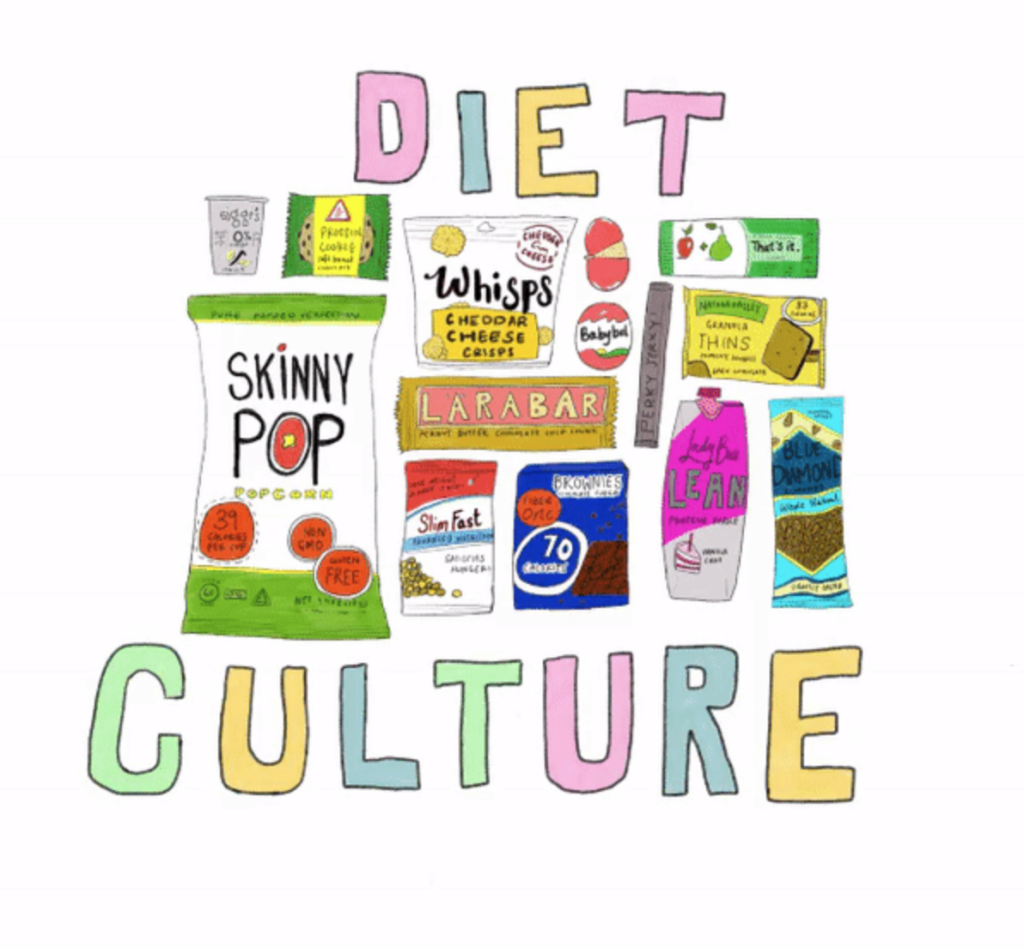Why Diet Culture Is Toxic

Image courtesy of WUNC
By Claire Prudhomme
Diet culture is thought of as the status quo of health within the United States and it is hard to see its toxicity until it is pointed out. Some examples of toxic diet culture is society’s encouragement of restrictive eating, extreme weight loss and unrealistic body standards. Diet culture leads the consumer to believe that extreme calorie deficits and the use of weight loss pills and shakes are maintainable. Not only are they not sustainable, they also cause a negative way of thinking that can be detrimental to mental health.
The diet culture industry is consistently profiting off of your insecurities. To lose weight, your body has to exert a certain amount of calories more than what you normally take in via food on a daily basis. This obviously varies from person to person but selling this image of a slim girl and what it takes to lose weight is obviously wrong. A diet is only temporary in maintaining a level of health due to the way diets cause so much temporary restriction.
In 2020, the United States diet and weight loss industry was worth $71 billion. The diet industry is not limited to skinny teas, detox pills and colon cleansing. It also has so much to do with food distribution within the United States. Even the mundane items like diet soft drinks, artificial sweeteners, diet-company chains, meal replacements, medical programs and more all are active participants in the way we are influenced by the fitness industry. In fact, the way that stores are organized tend to put “healthy” food at the forefront of the store.
Social media and the internet has only expedited the effectiveness of the toxic diet industry. With things like the Chloe Ting Workout Challenge and the widespread information about various diets like Keto, people are often left to the persuasiveness of toxic diet culture. The message they receive is what they are doing to be healthy is simply not enough.
Healthy isn’t limited to just one look. For so long, an industry has pushed an idea that a person has to be skinny and toned to be healthy. This is not true. Health isn’t a ‘one size fits all’ kind of scenario, it varies and fluctuates throughout a person’s life. Diets simply don’t contribute to health living, they provide temporary moments of healthy fixation; they don’t change the lifestyle of a person.
You don’t have to diet to live healthier or even to lose weight. The first step to living a healthy lifestyle is to implement small changes in your day to day life. Instead of eating a cookie every night, maybe try a cup of fruit every now and then. Keep doing this until you feel a habit start to form and studies show that it takes around 66 days on average to form a habit. Try to take the stairs instead of the elevator every once in a while. The key is that you don’t do it all at once.
The moment you create a multi-level plan, your brain is destined to be set back. Instead of saying you’re going to workout an hour a day, cut out all sweets, wake up early etc., pick one thing to make a habit at a time. If you change habits slowly, you can change your lifestyle permanently.
Also, there is nothing wrong with loving who you are and what you look like now but still want to change to be healthier. Your desire to change should be rooted in a want to feel happier and healthier, not to fit a certain standard. Practicing self-love is more important than fitting into society standards.
Confidence and the way that you look in clothes comes from an acceptance in yourself, not an acceptance by others. The moment that a person accepts themselves for who they are, it is easier to accomplish whatever goals they have.
Your body fuels you, so you better fuel it.





